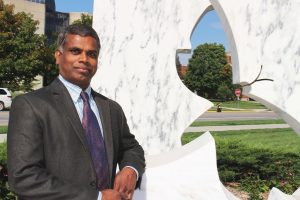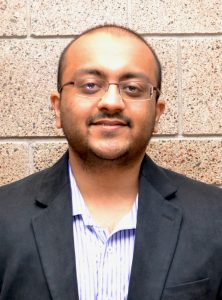The security of the modern power grid is constantly challenged with advanced cyber threats. The frequency of these cyber attacks and their sophistication has significantly increased over the last few years. This development has called for preventative and resilient methods and solutions in the cybersecurity realm.

A team led by Iowa State University Electrical and Computer Engineering Department (ECpE) Professor Manimaran Govindarasu has recognized this need and developed innovative cyber-physical system (CPS) security solutions to address this challenging problem. Recently, they have begun to develop cybersecurity solutions using game theory to address the dynamically changing threat landscape. He with Professor Sourabh Bhattacharya from ISU’s Mechanical Engineering department, were recently awarded a $777K grant from the National Science Foundation (NSF) for his project “CPS: Medium: Cyber Attack-Defense Modeling, Risk, and Contingency Analysis for the Power Grid using Game Theory.”
Game theory has been widely studied in economics and political science. It models rational behavior among selfish agents in terms of social outcomes and individual payoffs of the players to determine what decisions are made, what benefits or costs come from those decisions and who makes the decisions. Over the last few years, interest in game theory has grown among engineers and social scientists to analyze the fragility of large-scale engineering systems. This motivated Govindarasu and Bhattacharya to take a fresh perspective at the resilience of the power grid to cyber attacks. Until now, the risk assessment tools were qualitative and subjective, leaving uncertain results. Govindarasu said game theory can help researchers predict trends and estimate contingencies, such as plausible cyber attack scenarios, and how to prevent and/or mitigate contingencies in power grids.
Once Govindarasu and his team develop algorithms from the game theoretic tools, they plan to create a cyber risk assessment methodology to cover the risk possibilities and optimize security for power grids. The team will then focus on real-time operational planning with the game-theoretic formulations and begin to integrate them into what-if contingency analysis. The final step of the project involves validating the efficacy and evaluating the effectiveness of the developed solutions using the PowerCyber testbed, a realistic CPS security testbed environment for the smart grid, that Govindarasu’s team has developed over the years.
The research from this project has potential to improve the cyber security of other cyber-physical systems, such as oil, natural gas and transportation networks.
Palmer Department Chair Ashfaq Khokhar said Govindarasu’s award was a true reflection of his recognition as a leader in cybersecurity.

Govindarasu said the fund from the grant will be used to hire graduate students and further the research.
“This recognition of research and contribution to the field is satisfying,” Govindarasu said. “I’m excited for the opportunity to address a real-world problem in this area of cybersecurity leveraging interdisciplinary expertise of Iowa State University”
As for Bhattacharya, whose research interests are primarily in data-driven game theoretic models, he is excited about the models’ application to cyber-security in smart grids.
“An academic these days hardly gets any time to play games due to several deadlines and commitments,” Bhattacharya said. “I have the privilege to play games in my research, and this project will provide an opportunity to play on a real testbed.”
Iowa State’s research program in CPS security for the smart grid is supported by the NSF, DOE, DHS, PSERC, and ISU’s Electric Power Research Center.